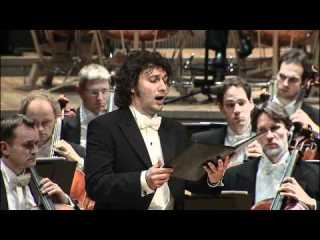Johannes Brahms – Rinaldo (2010)
Johannes Brahms – Rinaldo (2010)

1. Rinaldo, cantata for tenor, male chorus & orchestra, Op. 50 Jonas Kaufmann – tenor Herren des Rundfunkchors Berlin Herren des Chors des Bayerischen Rundfunks Berliner Philharmoniker Claudio Abbado - conductor 14.5.2010 Philharmonie Berlin
Brahms' Rinaldo, Op. 50, is a cantata for tenor, four-part male chorus and orchestra. Brahms would use the same forces, exchanging a solo alto for tenor, in his Alto Rhapsody, Op. 53.
Composed 1863-8 and published in 1869, Rinaldo was first performed on February 28, 1869, in Vienna with 300 chorus members accompanied by the Court Opera Orchestra. Although Rinaldo was much better received at its premiere than the Requiem was at its first performance, Brahms had reservations about the musical success of the work, and even suggested his publisher, Simrock, think twice about printing the score. Today, the Requiem is performed often and everywhere, whereas Rinaldo is almost never heard.
Brahms drew his text from Johann Wolfgang von Goethe's (1749-1832) Torquato Tasso, in which Goethe borrows from Tasso's (1544-95) Gerusalemme liberata (Liberated Jerusalem). This is the only text of a dramatic nature Brahms ever set. It is the story of the hero Rinaldo, who is unable to resist the charms of the enchantress Armida. Eventually Rinaldo is rescued by friends who put him back on the path to glory. The central concept of the tale is the distress of a lover unable extricate himself from the bonds of a passion that is beneath him. The text is not suitable for an operatic setting for several reasons, the most important of which is the fact that Armida never speaks. We learn of her presence only through the dialogue between Rinaldo and his friends.
Brahms almost certainly began composition of Rinaldo with the intention of entering a competition sponsored by the Aachen Liedertafel for a work for male chorus. He did not finish the cantata in time to enter the contest and neglected it until he finished his Ein deutsches Requiem in 1868. It seems Brahms originally intended Rinaldo to be through-composed, ending in C major with the chorus' "Geschwinde, geschwind." He added the final section, "Auf dem Meere" (On the Sea), which returns to the opening key of E flat major, after his return to the project.
Rinaldo is best understood as a sequence of vignettes held together by a verbal narrative, not by a rigorously applied musical structure. As a whole, it is somewhat uneven, although it has brilliant moments. For example, the orchestral introduction, with its leaping and falling woodwind motives over a syncopated accompaniment in the upper strings, combines material representing Armida's spell, Rinaldo's longing and his friends' attempts to help him.
Perhaps the most impressive section of the cantata is when Rinaldo's friends produce a diamond mirror and use it to show Rinaldo how he has fallen into decadence. When the chorus demands Rinaldo look into the mirror, the music moves to D flat major, but when Rinaldo responds to the sight of his own face with, "Weh! was seh' ich?" (Ah! what do I see?), melodic and harmonic chromaticisms create a quasi-Wagnerian atmosphere that disappears the instant the choir returns.
"Auf dem Meere," the sweeping closing segment, forms a fine musical whole within itself. In E flat major, its central section, on a contrasting G major, features antiphonal writing for a diminished chorus, just before the choir splits into two parts. ---John Palmer, Rovi
download: uploaded anonfiles mega 4shared mixturecloud yandex mediafire ziddu
Zmieniony (Piątek, 20 Wrzesień 2013 18:49)








